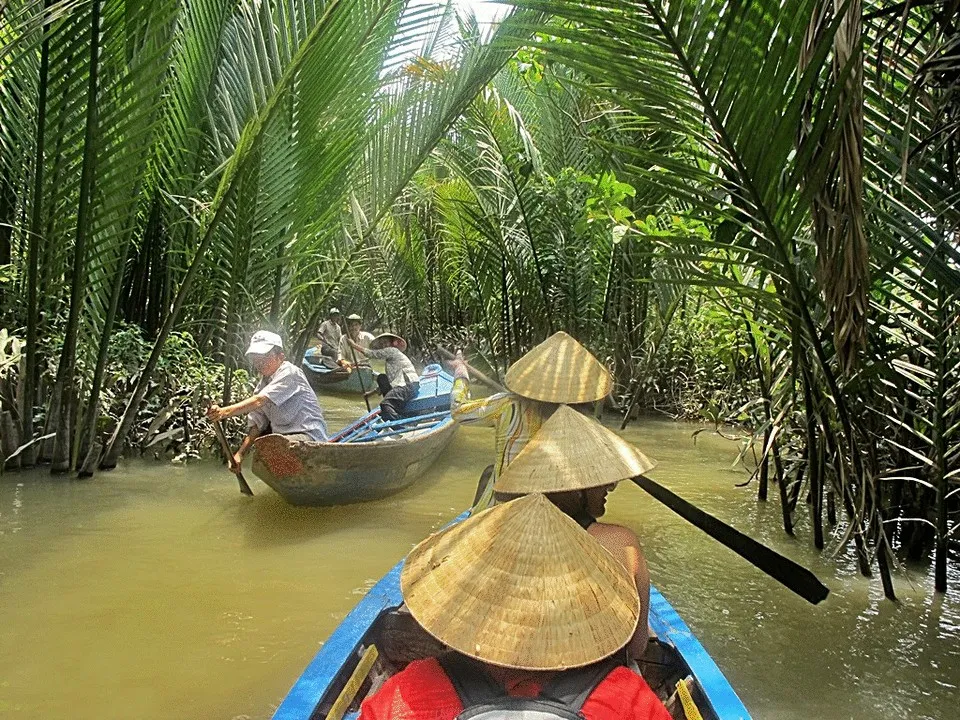
The Aus4Adaptation support package, valued at 94.5 million AUD (Australian dollars), aims to address the impacts of climate change on the Mekong Delta. This announcement is viewed as a significant milestone highlighting the resilience of the Mekong Delta's agricultural sector in the face of climate change challenges.
Addressing Climate Change
Climate change has significantly impacted the mangrove ecosystem along the coastal belt of the Mekong Delta, contributing to its deterioration. Consequently, the Australian Government-funded organic shrimp farming program, operating under the Business Partnership Platform Program (BPP), prioritizes addressing climate change while maintaining the existing conditions of the mangrove ecosystem. Private enterprise partners participating in this initiative contribute capital, aiming to restore the mangrove ecosystem without altering its current state.
Recently launched in Lam Hai commune, Nam Can district, Ca Mau province, this sponsorship program is slated to span two years, engaging approximately 500 households. Participants in the project will benefit from advancements in scientific and technological applications for shrimp production, aimed at enhancing productivity. Additionally, they will have access to input services such as genetically pure shrimp breeds provided by partnering businesses. These efforts align with the program's objective of enabling farmers to produce organic shrimp meeting international standards and certifications, facilitating their entry into the international market.
Mr. Lê Đình Huynh, General Secretary of The Vietnam Sustainable and Clean Shrimp Alliance (VSSA), emphasizes that enhancing the economic value of organic shrimp serves as a catalyst for sustainable adoption of this crucial economic model. As part of the program, participants will receive compensation for forest environmental services rendered on their lands by private enterprises, such as the Southern Shrimp Joint Stock Company, involved in the project. Moreover, the initiative commits to replanting 10 hectares of mangrove forests within two years of its implementation.
In Long An province, efforts to revive the floating season rice ecosystem and conserve the diverse genetic resources of floating season rice varieties are underway. Through sustainable and environmentally friendly agricultural development solutions, the Climate Resilience through Nutrition (CRxN) project aims to adapt to climate change in the Mekong Delta. In Tan Hung district, the project has already initiated the cultivation of 100 hectares of floating season rice. Commencing in July 2022 and slated to conclude in June 2024, this endeavor not only contributes to the gradual restoration of vital agricultural heritage but also aids in preserving biodiversity within the Láng Sen wetlands in the district.
Private Sector Solutions for Climate-Resilient Agriculture
The application of advanced technology in agriculture is pivotal in addressing the dual challenge of safeguarding sustainable natural ecosystems in the future and creating viable livelihood opportunities for local communities. This commitment underscores the Australian government's steadfast dedication to supporting Vietnam as a whole, with particular emphasis on the Mekong Delta region. However, past experiences have shown that many programs, upon completion, witnessed the withdrawal of sponsors, leading to their eventual discontinuation.
Therefore, to ensure the sustained participation of individuals in restoring the functions of flood areas, such as alluvial sedimentation, it is imperative for private sector enterprises to step in. They should not only provide support for output but also diversify products beyond rice, including popular dishes like phở and vermicelli. This strategy not only enhances the reputation of floating season rice but also contributes to the resilience of the agricultural sector in the region.
The private sector's significant role is prominently showcased in the "Creating Sustainable Livelihoods through Climate Adaptive Crops" project, currently underway in My Quoi commune, Nga Nam town, Soc Trang province. Utilizing saltwater plants like Scirpus littoralis Schrad and Typha orientalis, which are integral to the lives of Mekong Delta residents, the project focuses on producing handicraft wicker products for export. Under this initiative, the Australian Government provides catalytic support, enabling experts to enhance social and commercial impacts, while the Mekong Delta Research and Conservation Fund (MCF) oversees monitoring, evaluation, and advisory tasks.
In collaboration with the Vietnam Housewares Joint Stock Company, the Mekong Livelihood Solutions Joint Stock Company (MLS) spearheads the project, facilitating the collection of goods and seeking outlets for exporting products to international markets such as the US, Australia, and Japan. Remarkably, all manufactured goods are currently exported, highlighting the success and sustainability of this innovative endeavor.
In addition to providing livelihood opportunities for the community, the project also plays a crucial role in the restoration of native varieties of saltwater plants. Dr. Dương Văn Ni, an expert on biodiversity in the Mekong Delta and currently the President and Director of MCF, emphasized the significance of preserving indigenous varieties, stating, "Indigenous varieties represent the genetic heritage of each nation. The sooner a nation learns to preserve its indigenous varieties, the greater the legacy it will leave for future generations, much like the current ST25 rice variety."
Maintaining ecosystem sustainability in a balanced manner towards sustainable green agriculture is considered a prudent "algorithm" amidst the increasingly unpredictable impacts of climate change. Projects funded by the Australian Government have showcased the power of collective action in shifting consciousness, fostering a more informed and engaged community, and bolstering the resilience of the Mekong Delta agricultural sector in the face of climate change challenges.




















